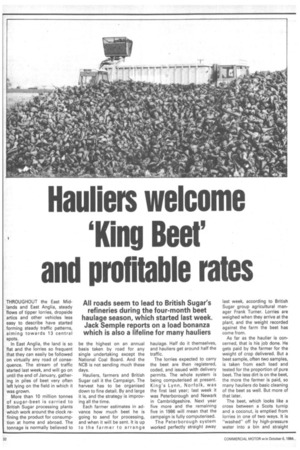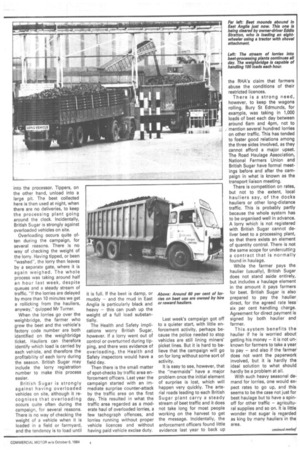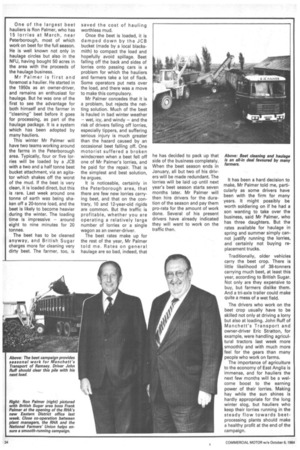Hauliers welcome 'King Beet' and profitable rates
Page 36

Page 37

Page 38

If you've noticed an error in this article please click here to report it so we can fix it.
THROUGHOUT the East Midlands and East Anglia, steady flows of tipper lorries, dropside artics and other vehicles less easy to describe have started forming steady traffic patterns, aiming towards 13 central spots.
In East Anglia, the land is so flat and the lorries so frequent that they can easily be followed on virtually any road of consequence. The stream of traffic started last week, and will go on until the end of January, gathering in piles of beet very often left lying on the field in which it was grown.
More than 10 million tonnes of sugar-beet is carried to British Sugar processing plants which work around the clock refining the product for consumption at home and abroad. The tonnage is normally believed to be the highest on an annual basis taken by road for any single undertaking except the National Coal Board. And the NCB is not sending much these days.
Hauliers, farmers and British Sugar call it the Campaign. The harvest has to be organised down to fine detail. By and large it is, and the strategy is improving all the time.
Each farmer estimates in advance how much beet he is going to send for processing, and when it will be sent. It is up to the farmer to arrange haulage. Half do it themselves, and hauliers get around half the traffic.
The lorries expected to carry the beet are then registered, coded, and issued with delivery permits. The whole system is being computerised at present. King's Lynn, Norfolk, was the first last year; last week it was Peterborough and Newark in Cambridgeshire. Next year five more and the remaining five in 1986 will mean that the campaign is fully computerised.
The Peterborough system worked perfectly straight away last week, according to British Sugar group agricultural manager Frank Turner. Lorries are weighed when they arrive at the plant, and the weight recorded against the farm the beet has come from.
As far as the haulier is concerned, that is his job done. He gets paid by the farmer for the weight of crop delivered. But a beet sample, often two samples, is taken from each load and tested for the proportion of pure beet. The less dirt is on the beet, the more the farmer is paid, so many hauliers do basic cleaning of the beet as well. But more of that later.
The beet, which looks like a cross between a Scots turnip and a coconut, is emptied from lorries in one of two ways. It is "washed" off by high-pressure water into a bin and straight
into the processor. Tippers, on the other hand, unload into a large pit. The beet collected here is then used at night, when there are no deliveries, to keep the processing plant going around the clock. Incidentally, British Sugar is strongly against overloaded vehicles on site.
Overloading occurs quite often during the campaign, for several reasons. There is no way of checking the weight of the lorry. Having tipped, or been "washed", the lorry then leaves by a separate gate, where it is again weighed. The whole process was taking around half an hour last week, despite queues and a steady stream of traffic. "If the lorries are delayed by more than 10 minutes we get a rollicking from the hauliers, anyway," quipped Mr Turner.
When the lorries go over the weighbridge, the farmer who grew the beet and the vehicle's factory code number are both identified on the weighbridge ticket. Hauliers can therefore identify which load is carried by each vehicle, and therefore the profitability of each lorry during the season. British Sugar may include the lorry registration number to make this process easier.
British Sugar is strongly against having overloaded vehicles on site, although it recognises that overloading occurs quite often during the campaign, for several reasons. There is no way of checking the weight of a vehicle when it is loaded in a field or farmyard, and the tendency is to load until it is full. If the beet is damp, or muddy — and the mud in East Anglia is particularly black and heavy — this can push up the weight of a full load substantially.
The Health and Safety implications worry British Sugar, however. If a lorry went out of control or overturned during tipping, and there was evidence of overloading, the Health and Safety inspectors would have a field day.
Then there is the small matter of spot-checks by traffic area enforcement officers. Last year the campaign started with an immediate surprise counter-attack by the traffic area on the first day. This resulted in what the traffic area regarded as a moderate haul of overloaded lorries, a few tachograph offences, and lorries running without proper vehicle licences and without having paid vehicle excise duty. Last week's campaign got off to a quieter start, with little enforcement activity, perhaps because the police needed to stop vehicles are still lining miners' picket lines. But it is hard to believe that the campaign will go on for long without some sort of activity, It is easy to see, however, that the "mermaids" have a major problem once the initial element of surprise is lost, which will happen very quickly. The arterial roads leading to each British Sugar plant carry a steady stream of beet traffic and it does not take long for most people working on the harvest to get the message. Incidentally, the enforcement officers found little evidence last year to back up the RHA's claim that farmers abuse the conditions of their restricted licences.
There is a strong need, however, to keep the wagons rolling. Bury St Edmunds, for example, was taking in 1,000 loads of beet each day between around fiam and 4pm, not to mention several hundred lorries on other traffic. This has tended to foster good relations among the three sides involved, as they cannot afford a major upset. The Road Haulage Association, National Farmers Union and British Sugar have formal meetings before and after the campaign in what is known as the transport liaison meeting.
There is competition on rates, but not to the extent, local hauliers say, of the docks hauliers or other long-distance traffic. This is probably partly because the whole system has to be organised well in advance. A lorry which is not registered with British Sugar cannot deliver beet to a processing plant, so that there exists an element of quantity control. There is not the same scope for undercutting a contract that is normally found in haulage.
While the farmer pays the haulier (usually), British Sugar does not stand aside entirely, but includes a haulage element in the amount it pays farmers for beet. British Sugar is also prepared to pay the haulier direct, for the agreed rate less six per cent handling charge. Agreement for direct payment is signed by both haulier and farmer.
This.system benefits the haulier if he is worried about getting his money — it is not unknown for farmers to take a year to pay — and also if the farmer does not want the paperwork involved, but it is hardly the ideal solution to what should hardly be a problem at all.
With such heavy seasonal demand for lorries, one would expect rates to go up, and this seems to be the case not just for beet haulage but to have a spinoff for other traffic — agricultural supplies and so on. It is little wonder that sugar is regarded as king by many hauliers in the area.
One of the largest beet hauliers is Ron Palmer, who has 15 lorries at March, near Peterborough, most of which work on beet for the full season. He is well known not only in haulage circles but also in the NFU, having bought 50 acres in the area with the proceeds of the haulage business.
Mr Palmer is first and foremost a haulier. He started in the 1950s as an owner-driver, and remains an enthusiast for haulage. But he was one of the first to see the advantage for both himself and the farmer in "cleaning" beet before it goes for processing, as part of the haulage package. It is a system which has been adopted by many hauliers.
This winter Mr Palmer will have two teams working around the farms in the Peterborough area. Typically, four or five lorries will be loaded by a JCB with a two and a half tonne beet bucket attachment, via an agitator which shakes off the worst of the mud. If the beet is very clean, it is loaded direct, but this is rare. Last week around one tonne of earth was being shaken off a 20-tonne load, and the beet is likely to become heavier during the winter. The loading time is impressive — around eight to nine minutes for 20 tonnes.
The beet has to be cleaned anyway, and British Sugar charges more for cleaning very dirty beet. The farmer, too, is saved the cost of hauling worthless mud.
Once the beet is loaded, it is damped down by the JCB bucket (made by a local blacksmith) to compact the load and hopefully avoid spillage. Beet falling off the back and sides of lorries onto passing cars is a problem for which the hauliers and farmers take a lot of flack. Some operators put nets over the load, and there was a move to make this compulsory.
Mr Palmer concedes that it is a problem, but rejects the netting solution. Much of the beet is hauled in bad winter weather — wet, icy, and windy — and the risk of drivers falling off lorries, especially tippers, and suffering serious injury is much greater than the hazard caused by an occasional beet falling off. One motorist suffered a broken windscreen when a beet fell off one of Mr Palmer's lorries, and he paid for the repair. That is the simplest and best solution, he argues.
It is noticeable, certainly in the Peterborough area, that there are few new lorries carrying beet, and that on the contrary, 10 and 12-year-old rigids are common. But the traffic is profitable, whether you are operating a relatively large number of lorries or a single wagon as an owner-driver.
The beet rates make up for the rest of the year, Mr Palmer told me. Rates on general haulage are so bad, indeed, that he has decided to pack up that side of the business completely. When the beet season ends in January, all but two of his drivers will be made redundant. The lorries will be laid up until next year's beet season starts seven months later. Mr Palmer will then hire drivers for the duration of the season and pay them pro-rata for the amount of work done. Several of his present drivers have already indicated they will want to work on the traffic then. It has been a hard decision to make, Mr Palmer told me, particularly as some drivers have been with the firm for many years. It might possibly be worth soldiering on if he had a son wanting to take over the business, said Mr Palmer, who has three daughters. But the rates available for haulage in spring and summer simply cannot justify running the lorries, and certainly not buying replacement trucks.
Traditionally, older vehicles carry the beet crop. There is little likelihood of 38-tonners carrying much beet, at least this year, according to British Sugar. Not only are they expensive to buy, but farmers dislike them. And a tri-axle trailer could make quite a mess of a wet field.
The drivers who work on the beet crop usually have to be skilled not only at driving a lorry but also at loading. John Ruff of Manchett's Transport and owner-driver Eric Stratton, for example, were handling agricultural tractors last week more smoothly and with much more feel for the gears than many people who work on farms.
The importance of agriculture to the economy of East Anglia is immense, and for hauliers the next few months will be a welcome boost to the earning power of their lorries. Making hay while the sun shines is hardly appropriate for the long winter slog, but hauliers who keep their lorries running in the steady flow towards beetprocessing plants should make a healthy profit at the end of the campaign.




























































































































































